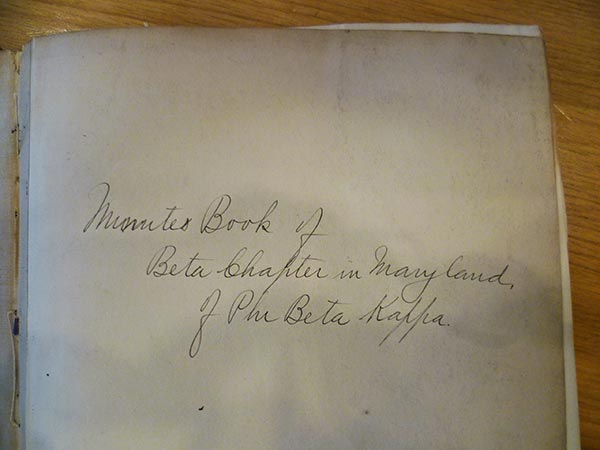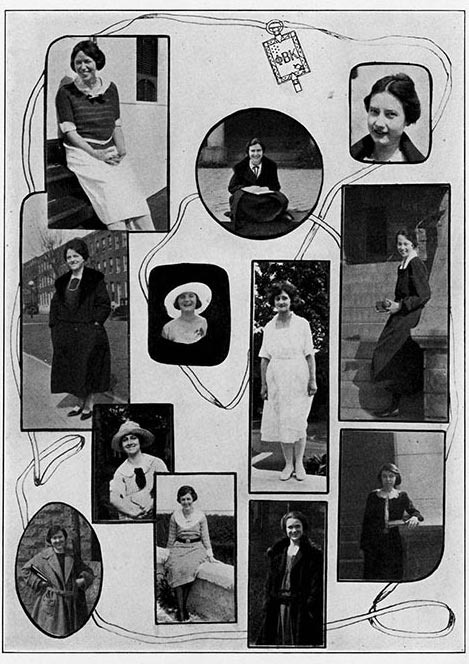Phi Beta Kappa History
The National Society
Phi Beta Kappa was founded on December 5, 1776, by a group of students at the College of William and Mary, in Williamsburg, Virginia. In their inaugural meeting, above a local tavern, they pledged to create a serious-minded student society that would be not just a social club but a venue for debate and scholarly inquiry—still a core value for today’s PBK. The early meetings of Phi Beta Kappa were secret, with the goal of allowing members the freedom to discuss any topic, no matter how controversial. The topics discussed ranged from history to politics to culture, and would have touched on viewpoints that were not countenanced in the members’ regimented classrooms.
As the American Revolutionary War continued, the members were persuaded to endorse the expansion of the society to other institutions. When the College of William and Mary was forced to close temporarily in 1781, with the advance of British troops on Williamsburg, the existence of new chapters at Harvard and Yale ensured that Phi Beta Kappa would survive the war. The New England college chapters became the seed of today’s national Phi Beta Kappa network.
During the early nineteenth century, Phi Beta Kappa began to distinguish itself, as an intellectual society, from the Greek-letter social fraternities that began to emerge at that time. The oaths of secrecy were dropped in the 1830s, and the public profile of the national society and its chapters rose in the 1880s with the formation of PBK’s National Council. As the national network grew, the society took steps toward greater inclusivity: the first women were inducted as members in 1875, and the first African American members in 1874. The first women’s college to receive a chapter of its own was Vassar, in 1899.
Today, with more than 290 chapters at U.S. colleges and universities, Phi Beta Kappa counts hundreds of notable alumni among its past and current members, and its alumni associations are active in more than 50 American cities.
The Beta of Maryland Chapter at Goucher College
Goucher’s Phi Beta Kappa chapter received its charter on September 7, 1904, as part of the first small group of women’s colleges to be so recognized. The Women’s College of Baltimore, as it was then known, was only the second institution in Maryland to be granted a chapter (after Johns Hopkins University), and our chapter was therefore designated by the second letter of the Greek alphabet, Beta. At the time, Goucher was the sixth women’s college to be chartered and was Phi Beta Kappa’s sixty-second national chapter.
In that same year of 1904, the National Council also granted charters to three of the most prestigious women’s schools—Smith, Mount Holyoke, and Wellesley Colleges—and it is striking that Goucher, a newcomer founded only twenty years previously, had already gained a strong enough reputation to be included in that select group.
The original book of minutes from 1905 recounts the details of the chapter’s founding, largely due to the efforts of the faculty at the time:
“The first movement toward a chapter of Phi Beta Kappa in the Woman’s College of Baltimore was a word of inquiry to the Secretary of the United Chapters as early as 1898. No petition however could be prepared for the Council that year, as the date of application for charter had already passed. For the council of 1901, a petition was prepared, but as there were technical mistakes in the method of drawing it, the Senate set it aside. The petition for the Council of 1904 was drawn up in due time, and was signed by the five members of Phi Beta Kappa then in the College faculty: Messrs. William H. Maltbrie, Maynard M. Metcalf, and Charles W. Hodell, and Misses Fanny Cook Gates and Jennie L. Whitbread. A brief statement of the charms of the Woman’s College to such consideration were duly prepared and printed by Dr. Maltbrie. Formal endorsements to the number of twelve were secured from separate chapters, including Johns Hopkins, Princeton, University of Pennsylvania, Brown, Columbia, Chicago, Northwestern, and DePauw Universities.
Dr. Maltbrie as delegate of the Hopkins Chapter attended the meeting of the United Chapters at Saratoga, Sept. 7, 1904 and very largely through his presentation and defense of our petition, the Council granted the charter.
The organization of the chapter was taken up by the four petitioners—Miss Whitbread in the meantime having resigned from the college—and the details of establishing the chapter were gradually worked out. The constitution and by-laws were adopted and a list of 31 original members were elected from the alumnae. The formal inauguration of the chapter was accomplished May 18, 1905 with an address by Dr. Hamilton W. Mabie, a Senator of the United Chapters, the subject: ‘Ideals in a Commercial Age.'”

Yearbooks throughout the 1920s and 1930s testify to Phi Beta Kappa’s visibility on campus in early days, with jokes about the reputation of PBK members as ferocious academic achievers (the yearbook photo of the 1923 PBK initiates is captioned “They tried to look human.”).
Since that time, Goucher College has inducted no more than ten percent of each graduating class into Phi Beta Kappa. Not coincidentally, many of Goucher’s most distinguished alumnae earned induction as a portent of their future success. These include Olive Wetzel Dennis, Sarah Tilghman Hughes, and Sara Haardt Mencken.

